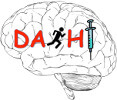Title
Desmopressin for reversal of Antiplatelet drugs in Stroke due to Haemorrhage (DASH)
|
Acronym
DASH
|
Chief investigator
Professor Nikola Sprigg
|
Deputy CI
Dr Michael Desborough
|
Objectives
To assess the feasibility of screening, checking the eligibility,
approaching, randomising, administering the intervention and completing
follow-up for patients treated with either desmopressin or placebo to
inform a definitive trial.
|
Trial configuration
A phase II double blind randomised placebo controlled feasibility trial
|
Setting
Secondary care
|
Sample size estimate
This is a feasibility study so there is no formal sample size
calculation. It is likely that a large definitive trial would be
feasible if at least 50 participants were recruited into this study, that
adherence to study drug was high and that a high proportion of follow-up
data was available. Lower recruitment would not preclude
progression if there was some evidence that the barriers to recruitment
identified could be overcome.
|
Number of participants
50
|
Eligibility criteria
Inclusions
-
Adults (at least 18 years old) with confirmed intracerebral
haemorrhage on imaging
-
Event less than 24 hours from onset of symptoms, or from when
last seen free of stroke symptoms (for sleep stroke, take onset as
bed time)
-
Prescribed and thought to be taking a daily oral antiplatelet drug
in the preceding seven days – Aspirin, Dipyridamole,
Clopidogrel, Prasugrel (Efient®) and/or Ticagrelor
(Brilique®).
Exclusions
-
Aneurysmal subarachnoid haemorrhage known at time of randomisation
-
Haemorrhage suspected to be due to transformation of ischaemic stroke
or trauma
-
Haemorrhage known to be due to thrombolytic drug or venous thrombosis
-
Risk(s) of fluid retention associated with desmopressin judged
clinically significant by the attending physician (for example
patients with pulmonary oedema and/or cardiac failure)
-
Significant hypotension (systolic blood pressure under 90 mmHg)
-
Known drug-eluting coronary artery stent in previous three months
-
Allergy to desmopressin
-
Pregnant or breastfeeding
-
Life expectancy less than four hours, or planned for
palliative care only
- Severe pre-morbid disability (modified Rankin scale is 5)
-
Glasgow coma scale less than 5
-
Geographical or other factors that prohibit follow-up at 90 days,
e.g. no fixed address or telephone contact number, or overseas
visitor
|
Description of interventions
Intravenous desmopressin: 20µg in 50 mls Sodium Chloride 0.9%
infused over 20 minutes.
Comparator – placebo (Sodium
Chloride 0.9% intravenous infusion) administered by identical regimen.
|
Duration of study
12 months.
Participants will be followed up for 90 days.
|
Randomisation and blinding
Patients will be randomised (1:1) to receive either desmopressin or
matching placebo (Sodium Chloride 0.9%) via intravenous injection.
Randomisation will be performed by the Stroke Trials Unit (STU) and
involve computerised minimisation on key prognostic factors: age; sex;
time since onset; systolic blood pressure; and presence of
intraventricular haemorrhage. Patients, relatives, researchers and
outcome assessors will be masked to treatment allocation.
|
Outcome measures
Feasibility outcomes:
- Number of eligible patients who receive allocated treatment
- Rate of eligible patients randomised
- Proportion of eligible patients approached
-
Proportion of eligible patients randomised and reasons for
non-randomisation
- Adherence to intervention
-
Proportion of participants followed up to 90 days and reasons for loss
to follow-up
-
Proportion of randomised participants with full outcome data available,
and reasons for non-availability
Secondary clinical outcomes:
- Hyponatraemia at 24 hours
- Early case fatality <28 days
- Case fatality at day 90
-
Serious adverse events (including thromboembolic events) up to day 90
- Change in intracerebral haemorrhage volume at 24 hours
- Discharge destination
- Disability (Barthel index, day 90)
- Quality of life (EuroQol, day 90)
- Cognition (telephone MMSE day 90)
- Length of hospital stay
- Health economic assessment (EQ-5D)
-
Assessment of baseline platelet dysfunction (P-selectin) and
correlation
with response to desmopressin
-
Change in factor VIII, VWF antigen and VWF activity, one hour after
administration of desmopressin
|
Statistical methods
This is a feasibility trial and the main analysis will be with
descriptive statistics only. Counts will be summarised using N and
%, and continuous variables will be summarised using means and standard
deviations or medians and interquartile ranges depending on their
distribution. Whilst some variables will be summarised by treatment
group, no formal statistical comparisons will be made and any analyses
will be considered purely exploratory.
|
